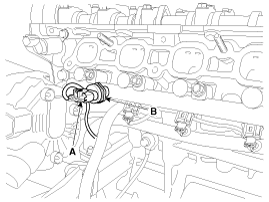Kia Cee'd: Engine Control System / Rail Pressure Sensor (RPS) Repair procedures
| 1. |
Connect the GDS on the Data Link Connector (DLC).
|
| 2. |
Measure the output voltage of the RPS at idle and various engine speed.
Condition
|
Output Voltage (V)
|
Idle
|
Approx.
1.2
|
1,500 rpm
|
2.2 ~ 2.5
|
6,300 rpm
|
Approx.
3.0
|
|
| 1. |
Turn the ignition switch OFF and disconnect the battery negative (-)
cable.
|
| 2. |
Release the residual pressure in fuel line.
(Refer to Fuel Delivery System - "Release Residual Pressure in Fuel
Line")
|
When removing the fuel pump relay, a Diagnostic Trouble Code
(DTC) may occur. Delete the code with the GDS after completion
of “Release Residual Pressure in Fuel Line” work.
|
|
| 3. |
Remove the intake manifold.
(Refer to Engine Mechanical System - "Intake Manifold")
|
| 4. |
Disconnect the rail pressure sensor connector (A), and then remove the
sensor (B) from the delivery pipe.

|
| • |
Install the component with the specified torques.
|
| • |
Note that internal damage may occur when the component is dropped.
If the component has been dropped, inspect before installing.
|
|
| 1. |
Installation is reverse of removal.
|
Rail Pressure Sensor Installation:
29.4 ~ 34.3 N.m (3.0 ~ 3.5 kgf.m, 21.7 ~ 25.3 lb-ft)
|
|
Description
Accelerator Position Sensor (APS) is installed on the accelerator pedal module
and detects the rotation angle of the accelerator pedal. The APS is one of the
most imp ...
Other information:
Kia Cee'd JD Service Manual: Components and components location
Component Location
Item
Description
SPAS
SPAS unit
(ECU)
• Calculate the parking trace of wheels
• Calculate and ask the demand angle to MDPS
• Warning and detect ...
Kia Cee'd JD Owners Manual: Caring for Disc
If the temperature inside the car is
too high, open the car windows to
ventilate before using the system.
It is illegal to copy and use
MP3/WMA files without permission.
Use CDs that are created
only by lawful means.
Do not apply volatile agents, such
as benzene and thinner, ...
 Rail Pressure Sensor (RPS) Schematic diagrams
Rail Pressure Sensor (RPS) Schematic diagrams Accelerator Position Sensor (APS) Description and operation
Accelerator Position Sensor (APS) Description and operation


